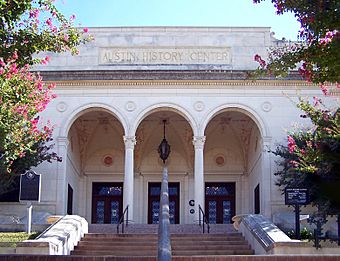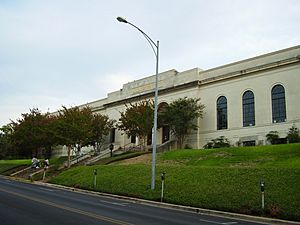Austin History Center facts for kids
|
Austin History Center
(NRHP: Austin Public Library) |
|

The Austin History Center main entrance
|
|
| Location | 810 Guadalupe St Austin, Texas, USA |
|---|---|
| Built | 1933 |
| Architect | Hugo Kuehne J. Roy White |
| Architectural style | Renaissance Revival |
| NRHP reference No. | 93000389 |
Quick facts for kids Significant dates |
|
| Added to NRHP | May 6, 1993 |
The Austin History Center is a special place in Austin, Texas. It holds many important historical items. Think of it as Austin's memory bank! It keeps old documents, photos, maps, and stories about the city.
This building first opened in 1933 as the main Austin Public Library. It served as the city's main library until 1979. Then, a new library, the John Henry Faulk Library, opened right next door. The Austin History Center building was designed by local architects J. Roy White and Hugo Kuehne. It has a beautiful Renaissance Revival style. Many skilled local artists helped create its amazing details. These include ironworker Fortunat Weigl, wood-carver Peter Mansbendel, and fresco artist Harold "Bubi" Jessen.
The Austin History Center celebrated its 50th birthday in 2005. Today, it has thousands of items. These include documents, photographs, maps, and personal histories. The center often hosts special exhibits and speakers. It's a great place to learn about Austin's past.
The historic library building was added to the National Register of Historic Places on May 6, 1993. This means it's a very important historical site. A special marker outside the building shows it's a Texas Historic Landmark.
Contents
Exploring the Austin History Center
Beautiful Art and Design
The Austin History Center has many cool design features. Local artists added their special touches to the building. Let's explore some of them!
The Loggia Fresco
The front entrance has a covered walkway called a loggia. It has arches and columns that match the building's style. On the ceiling of this walkway, there's a hand-painted fresco. A fresco is a painting done on wet plaster. This one was created by Harold "Bubi" Jessen.
Bubi Jessen came to Austin from Germany as a child. He studied architecture at the University of Texas. He even designed more than 20 buildings for the university! His fresco shows winged horses and flowing lines.
Amazing Ironwork
The main entrance has three large wooden double doors. Above them are transom windows. These windows, and the exterior balcony railings, have fancy ironwork. This beautiful work was made by a master ironsmith named Fortunat Weigl.
Fortunat Weigl moved to Austin from Germany. He started his own company, F. Weigl Iron Works. His sons later joined the business. Their old workshop is now the famous Iron Works Barbeque restaurant! The Weigl family's ironworking tradition continues today.
Detailed Wood Carvings
Inside the center, you'll see amazing wooden details. These were carved by Peter Mansbendel. He was a Swiss immigrant and a very talented woodcarver. Peter studied his craft in big cities like London and Paris.
He met his wife, Clotilde Shipe, in New York. Her father helped develop the Hyde Park area in Austin. You can find Peter Mansbendel's work in other places too. He carved plaques for former university presidents at the University of Texas.
Inside the Center's Rooms
The Main Lobby
When you walk into the main lobby, you'll notice the walls. The lower part has oak wood panels. There are also columns that go up to the ceiling. The ceiling itself is made of plaster and has five sections with chandeliers. These lights add to the classical look of the room. The rubber tile floors in the lobby are original from 1933!
The Holt Gallery
The David Earl Holt Gallery Room is to the left of the lobby. It can hold up to 62 people. Non-profit groups can reserve this room. It has a fireplace that is original to the building from 1933. The fireplace has special carvings by Fred Eder.
The Mayor's Room
The Mayor's Room is connected to the Holt Gallery. It's named this because it has pictures of Austin's mayors. These pictures show the city's leaders all the way back to 1839.
The O. Henry Collection
The O. Henry Room holds a large collection of items from William Sydney Porter. He lived in Austin in the late 1800s. William Porter was a famous short story writer. He used the pen name O. Henry. This room has some of his original furniture. Many items were given by Judge Trueman E. O'Quinn and other families.
The Reading Room
The Reading Room is on the right side of the lobby. This is where visitors can sit and do their research. It has soft carpet and original tables and chairs from 1933. The lamps were designed especially for this room in the 1980s. Large arched windows let in lots of light. There are also columns that divide the room.
See also
 In Spanish: Centro de Historia de Austin para niños
In Spanish: Centro de Historia de Austin para niños
 | Valerie Thomas |
 | Frederick McKinley Jones |
 | George Edward Alcorn Jr. |
 | Thomas Mensah |




